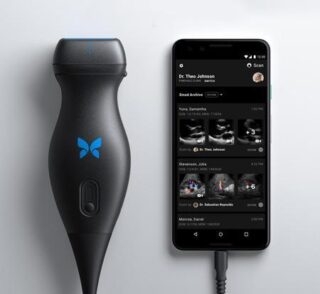Q Exchange
Training rural GPs in Northern Ireland to use portable ultrasound
- Idea
- 2024

Meet the team
What is the challenge your project is going to address and how does it connect to the theme of 'How can we improve across system boundaries?
As a GP in a rural setting, I am often frustrated by the barriers to my patients accessing the right services in a timely fashion. I have been using point of care ultrasound (POCUS) to aid diagnosis in the community, especially in elderly and housebound patients who find it difficult to travel a 90minute round trip to the local hospital. With simple training I have been able to diagnosis, DVTs, abscesses, joint effusions, gallstones and joint problems, amongst many other conditions, saving resources for my secondary care colleagues, and saving my patients a long round trip, and directing them to the appropriate service from the start.
Efficient use of resources at the primary and secondary care interface is especially important in NI, with the longest waiting times in the UK. The burden on our ambulance service and ED departments exceeds any where else in these islands. GPs can help, however.
What does your project aim to achieve?
My vision is:
- to design a curriculum for primary care POCUS training;
- to assist in provision of ultrasound equipment with remote mentoring functions
This will enable upskilling of GPs, both trainees and qualified doctors, to implement a novel approach to primary care diagnostics in Northern Ireland.
How will the project be delivered?
This is an entirely new concept in Northern Ireland, and still in its infancy in the UK. However, POCUS is used to a greater degree in Western Europe. I have already established links with colleagues in other parts of the UK who are interested in primary care POCUS, and am participating in a research study run by EFSUMB (https://efsumb.org/) on primary care POCUS.
I have spent the last 3 years familiarising myself with many of the ultrasound devices on the market, and trialling implementations of them in my own practice in a safe and effective way, and have also started reaching out to GPs in NI who may be interested in developing their skills, or who have previous secondary care ultrasound experience.
I am investigating the possibility of using reconditioned ex-hospital equipment, or of re-using loaned items for initial training periods, in order to reduce cost and help prevent electrical waste.
How is your project going to share learning?
The concept of POCUS is fairly radical in NI and UK – non-specialists using novel handheld and portable equipment, outside of a hospital setting, to answer clear, binary yes/no questions of patients’ examination findings, as an aid to existing clinical examinations, to help prevent inappropriate referrals, direct patients to the correct resources first time, and to upskill GPs, helping retain and encourage a specialty which is currently struggling to regain its mojo.
There is a trickle-down effect, not just of the ultrasound technology, but of the skills and lessons learned from ED and Respiratory colleagues who use similar techniques, and now incorporate them in their curricula. If we can build a simple core set of diagnostic scenarios, with simple yes/no questions asked of our ultrasound findings, then we can encourage both GPs, but also our secondary care colleagues that this is a legitimate resource, and eminently scaleable UK-wide.
How you can contribute
- - How to build a curriculum which is evidence based, in-depth enough, without onerous supervision requirements
- - Remote mentoring models - what works?
- - Getting suspicious secondary care colleagues on side - how to win friends and influence people!
- - How to get the ear of industry - this is a potentially large, untapped marked
Plan timeline
| 6 Feb 2024 | Acquire and set up ultrasound equipment |
|---|---|
| 6 Feb 2024 | Draft a curriculum with primary/secondary colleague input |
| 6 Feb 2024 | Identify a first cohort of GPs willing to train |
| 6 Feb 2024 | Identify an industry partner for equipment provision |
| 6 Feb 2024 | Launch training programme with first cohort of GPs |
Comments
Jacqueline Morton 15 Mar 2024
Andrew your project could have a very positive impact on improving patient care and experience and streamlining the patients journey. How are you planning to engage and involve secondary care colleagues and other key stakeholders in the design and evaluation process?
Andrew Cupples 15 Mar 2024
Thanks Jacqueline! Emergency Medicine have been here before, as have Thoracics. I've already got a couple of contacts in those specialties who are fellow US nuts, who I plan to cajole into coffee and buns, and pick their brains about their journey to a curriculum, and how to gain wider acceptance in a specialty. There's no point in completely designing something from scratch when ED, for example, have a set of core compencies which they've built over time, so I can learn from their experience, and from the experience of the docs who were involved in that - in some ways, they've fought the battles already.
The evaluation will probably come as part of a broader research process with EFSUMB (European Federation of Societies for Ultrasound in Medicine and Biology) whicn are running a Delphi study for frontline physicians looking at this broad area, which I'm contributing to; here's a link to their piece...
https://efsumb.org/wp-content/uploads/2023/07/Strategic_5yr_Plan_combined2023.pdf
Thomas John Rose 12 Feb 2024
This webinar may be of interest: https://govconnect.co.uk/webinars/webinar-luscii-21st-february-2024/
About remote monitoring
Andrew Cupples 16 Feb 2024
Thanks Thomas!
Comments are now closed for this post.